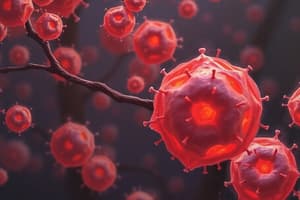Podcast
Questions and Answers
Class II MHC proteins are found on which of the following cell types?
Class II MHC proteins are found on which of the following cell types?
- All nucleated cells
- Antigen-presenting cells (correct)
Which class of MHC proteins presents exogenous antigens?
Which class of MHC proteins presents exogenous antigens?
- Class I MHC proteins
- Class II MHC proteins (correct)
Class I MHC proteins are recognized by which of the following cell types (that are destined to become T cells)?
Class I MHC proteins are recognized by which of the following cell types (that are destined to become T cells)?
- CD4
- CD8 (correct)
Which of the following types of cells display protein fragments produced by the cancer within them?
Which of the following types of cells display protein fragments produced by the cancer within them?
Which major class of lymphocytes become cytotoxic T cells?
Which major class of lymphocytes become cytotoxic T cells?
Which statement is true about T cells?
Which statement is true about T cells?
All of the following are true of the classical pathway of complement activation except one. Select the one answer that does not describe the classical pathway of complement activation.
All of the following are true of the classical pathway of complement activation except one. Select the one answer that does not describe the classical pathway of complement activation.
What is the role of IgM?
What is the role of IgM?
What does IgA protect?
What does IgA protect?
What is the role of IgG?
What is the role of IgG?
What is the function of IgD?
What is the function of IgD?
What is the role of IgE?
What is the role of IgE?
How does a lymphocyte exhibit immunocompetence?
How does a lymphocyte exhibit immunocompetence?
Select the best description of the negative selection process of lymphocyte maturation.
Select the best description of the negative selection process of lymphocyte maturation.
Which of the following statements is incorrect?
Which of the following statements is incorrect?
What happens in the absence of helper T cells?
What happens in the absence of helper T cells?
What is the function of B cells?
What is the function of B cells?
What is the role of cytotoxic T cells?
What is the role of cytotoxic T cells?
What is the function of memory cells?
What is the function of memory cells?
What is the role of regulatory T cells?
What is the role of regulatory T cells?
What is the rationale for not medicating a fever of 100.4F when Tylenol is ordered for a temperature greater than 101 degrees F?
What is the rationale for not medicating a fever of 100.4F when Tylenol is ordered for a temperature greater than 101 degrees F?
Flashcards are hidden until you start studying
Study Notes
MHC Proteins and Cell Types
- Class II MHC proteins are exclusively found on antigen-presenting cells.
- Class II MHC proteins present exogenous antigens, which originate from outside the cell.
- Class I MHC proteins are recognized by CD8 T cells.
Cancer and Immune Response
- All nucleated cells display protein fragments from endogenous proteins, including cancerous cells.
- Cytotoxic T cells develop from CD8 cells, playing a crucial role in targeting infected or cancerous cells.
T Cell Activation and Function
- T cell activation is enhanced by interleukins 1 and 2, promoting their proliferation.
- T cells recognize antigens directly, activating specific subpopulations such as killer cells.
Complement Activation Pathways
- The classical pathway of complement activation involves the binding of antibodies to antigens and enhances inflammation and opsonization.
- It does not activate T-helper cells by presenting antigen.
Antibody Types and Functions
- IgM is the first antibody to peak during a primary immune response.
- IgA is crucial for protecting mucosal barriers.
- IgG serves as the main antibody in both primary and secondary immune responses.
- IgD functions as a B cell receptor alongside IgM.
- IgE is primarily involved in mediating allergic reactions.
Immunocompetence and Lymphocyte Maturation
- Immunocompetence in lymphocytes is indicated by their ability to recognize specific antigens, not self-antigens.
- Negative selection during lymphocyte maturation involves the removal of those that react with self-cells, preventing autoimmunity.
Functions of Immune Cells
- Helper T cells are vital for initiating and regulating the immune response; their absence results in an inability to mount an effective immune response.
- B cells are responsible for forming antibody-producing cells critical for humoral immunity.
- Cytotoxic T cells effectively kill cancer and virus-infected cells.
- Memory cells allow for a more rapid and efficient response during secondary exposures to antigens.
- Regulatory T cells function to slow or halt the immune response to maintain balance and prevent overreaction.
Clinical Insight on Fever Management
- A mild fever (e.g., 100.4°F) may not require medication as it can be part of a natural immune response.
Studying That Suits You
Use AI to generate personalized quizzes and flashcards to suit your learning preferences.




